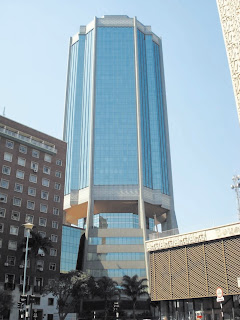Zimbabwe’s financial crisis, monetary policy and the role of the central bank
The purpose of a central bank is to
supply operational capital to the country’s banking sector. The primary purpose
of a central bank is to promote the stability of a country’s financial system achieve price stability (low and stable inflation) and help manage economic fluctuations.Central banks communicate to the public through economic policy and inflation rate targeting has emerged as the leading framework for monetary policy. The
central bank can lend to the banking sector thereby ensuring that the banking
system has sufficient liquidity for companies and individuals to borrow money
because the availability of credit has a direct impact on business and consumer
spending. It is also the role of the central bank to ensure that there is
sufficient liquidity in the economy so that depositors can withdraw their
savings.
Zimbabwe is currently experiencing difficulties
to obtain foreign currency to meet international payments obligations. The difficulties
to generate sufficient foreign currency have developed into a crisis. Zimbabwe’s
own currency the bond note is going to be forced to depreciate rapidly, imports
and international capital is going to be more expensive, the industry in the
country is also going to experience disruption. The unrealistic official exchange rate between the bond note and the US dollars has led to the development of the parallel market. A situation which diverts foreign currency away from the RBZ and the banking system. The situation leads to more foreign currency shortages and large devaluation of the bond note. The bond note was meant to help free foreign currency by having a currency for local transactions whilst foreign currency is utilized for international payments. The effect of the bond note is actually opposite of the central bank's proposition.
The country has a weak domestic
financial system, persistent budget deficits, high level of external and
internal public debt and the bond note-US dollar exchange rate fixed at
inappropriate level all factors which affect domestic production and will lead
to reduced exports. There has been a sudden increase in the price of key
commodities such as food and fuel which is going to further increase imports.
The country’s trade account situation continues to worsen as the gap between
exports and imports is widening. The current imbalances in certain sectors is
going to quickly spread to other sectors leading to widespread economic
disruption.
The country will require adjustment policies and reforms necessary to restore conditions for strong and sustainable growth, employment and social investment. Without corrective policy measures, reforms and an adjustment programme Zimbabwe will permanently experience negative balance of payments and foreign currency shortages. The measures required are more than the so called nostro stabilization facilities recently publicized by RBZ. There is need to address problems that led to loss of investor confidence and capital flight. The revival of the local industry can consequently lead to reduction in imports and help increase the much needed exports. The government's budget deficits need to be controlled and the domestic banking system needs to be stabilized.
In the absence of IMF financing, the adjustment process is more difficulty but the country has no choice but to adjust through a painful compression of imports and economic activity. If Zimbabwe had IMF financing a more gradual and carefully considered adjustment would be implemented and technical assistance provided. A country with a trade deficit like Zimbabwe experiences a reduction in its foreign currency supply, and given that the country does not have foreign currency reserves as well, the situation depreciates the value of its currency (bond note/Zim dollar). Fixed exchange rates are not the same as decreed or command exchange rates as is the case with bond note-US dollar exchange rate. It should also be noted that no currency has ever been backed by a bank facility such as the bond note and the Afreximbank facility. A currency cannot be backed by a bank facility, this is a terrible experiment.
In the absence of IMF financing, the adjustment process is more difficulty but the country has no choice but to adjust through a painful compression of imports and economic activity. If Zimbabwe had IMF financing a more gradual and carefully considered adjustment would be implemented and technical assistance provided. A country with a trade deficit like Zimbabwe experiences a reduction in its foreign currency supply, and given that the country does not have foreign currency reserves as well, the situation depreciates the value of its currency (bond note/Zim dollar). Fixed exchange rates are not the same as decreed or command exchange rates as is the case with bond note-US dollar exchange rate. It should also be noted that no currency has ever been backed by a bank facility such as the bond note and the Afreximbank facility. A currency cannot be backed by a bank facility, this is a terrible experiment.
Currency markets sets values contrary to the command or decreed exchange rate between the bond note and the US dollar. The freely trading of bond notes with multiple currencies mean that the markets will determine what a currency is worth including the bond note itself. The introduction of more bond notes into the market by the Reserve Bank of Zimbabwe increases its supply, and lowers the price if demand remains constant. On the other hand, if the RBZ restricts the supply of bond notes, it is an attempt to strengthen it. The only way RBZ can do this is by using foreign currency to buy its bond notes, however with the shortage of foreign currency they are currently experiencing they do not have the capacity. The government does not have foreign currency to intervene into the markets to sustain the bond note-US dollar exchange rate which means the market has to take over. There is a limit to management of exchange rates and when the market takes over it is usually with vengeance as has been the case with Venezuela.



Comments
Post a Comment